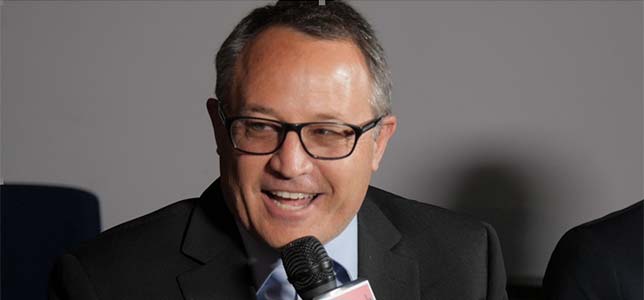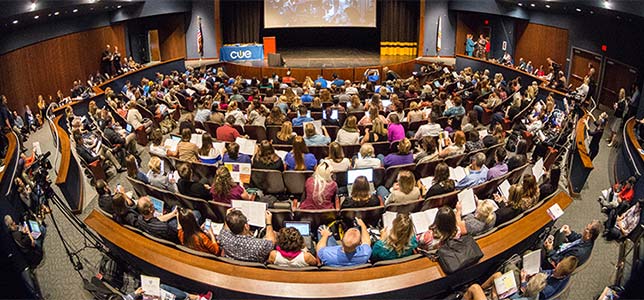Keynote: Jon Corippo, Interim Executive Director, CUE

CUE is an ed tech association on the move. Known nationally for its annual conference in Palm Springs (coming up March 14–17), which typically attracts 5,000 to 7,000 attendees — a massive figure for a regional organization — CUE is ramping up its efforts in several areas in the coming year, including teacher professional development and advocacy of education issues like E-rate, net neutrality and student data privacy.
CUE is also an organization in transition. When the non-profit's long-standing executive director, Mike Lawrence, stepped down from his leadership role this fall, Chief Innovator Jon Corippo stepped in as interim ED. As of this writing, CUE's board had not yet chosen a permanent successor, but organizational changes are already happening, with the staff now composed of a majority of educators. (And for the record, Corippo himself is an Apple Distinguished Educator, Google Certified Teacher, Microsoft Innovative Educator and YouTube Star Teacher.)

CUE operates in California and Nevada, with 22 affiliates, and is itself an affiliate of three major, national ed tech associations: ISTE, iNACOL and SETDA. Aside from its national conference, CUE also hosts a fall conference and several smaller events for administrators and teachers. It also operates "Rock Star Black Label Camps," which bring professional learning directly to schools. A single-year membership is free through mid-March for educators throughout the country.
THE Journal spoke with Interim Executive Director Corippo to get a sense of the direction in which the association is heading in light of organizational changes and to find out what special surprises the upcoming national conference has to offer.
THE Journal: This is a big year for CUE. There's a lot of change happening in your organization, not to mention the ongoing change happening in the profession of teaching. Can you talk about the direction you see CUE heading in the coming year and in the longer term?
Jon Corippo: We are very excited about several developments internally, namely that we've modernized all our back-office systems for significantly better member interactivity and support without growing our staff size. With our new directors (Cate Tolnai and Jason Seliskar) our CUE staff is made up of more educators than ever before (56 percent), so we truly understand our members' needs. We've added things like live chat for events, and we now have a four-person social media team made up of CUE members that will be sharing awesome pedagogical and ed tech ideas via social media — this team has an aggregate of over 60,000 followers on Twitter alone. At our Fall CUE Conference, we announced a new, multi-year effort to have our conferences become increasingly green (cue.org/green), reducing our use of one-time use items, plastics and recycling more effectively. For example, we will stop using plastic lanyards and stop giving out conference bags altogether. CUE is also making a huge effort to support our 22 affiliates in California and Nevada — assisting them with things like bylaws and maintaining nonprofit status as well as event support and co-marketing efforts.
New developments for CUE in professional learning will soon include online, asynchronous learning that will be priced so that teachers can self-fund their own upskilling. We have Apple-, Google- and Microsoft-centric versions coming online this spring. What's great about these online courses is that they will blend ed tech skills with excellent pedagogical approaches to teaching and learning. Great teaching is way more than gadgetry.
As far as professional learning at CUE, we are excited to continue with our wildly popular ... CUE Rock Star Black Label Camps (cue.org/BlackLabel), where we are able to bring very high-quality professional learning events directly to districts, saving them any associated costs for hotels and mileage....
THE Journal: can you talk a little about the format of the asynchronous courses and the way you'll be handling continuing education credits? Will these be open to all educators or just CUE members?
Corippo: We'll be developing curricula that are very much hands-on and project-based (things folks will be able to use in class immediately). We'd love to have CEUs, but it's not finalized yet. These will be open to anyone — and CUE membership is free anyway....
THE Journal: What are some of the trends in education you see impacting your members now, and how will CUE be addressing those in its events and advocacy activities?
Corippo: The big struggle we are seeing is that as more and more districts go 1-to-1, there is a real gap developing in how teachers are (or aren't ) embracing the devices to actually teach differently. We are seeing the need for professional development towards SAMR and 4Cs type mindsets — the more devices, the bigger the problem is becoming. Districts are also wrestling with being able to continue refreshing almost everything, projectors and student devices especially. In California and Nevada, funding streams are drying up in the general budget, making additional professional learning more difficult to fund at the same time as the needs in the classroom are dramatically increasing.
Another significant area of concern is the potential endangerment of E-rate and net neutrality for schools and educators. The CUE Legislative Advocacy Team recently scored a victory in this area, partnering with California State Assembly Speaker Pro Tempore Kevin Mullin to pass Assembly Joint Resolution 7 (AJR7) which states: "The new Chair of the FCC, Ajit Pai, has a history of opposing these programs while serving as a Commissioner and in his capacity as Chair has indicated that he plans to either roll back or decline to enforce many of these consumer protection regulations. It is my hope that members of Congress and other FCC Commissioners will work to protect these critical programs and AJR 7 provides them with ample rationale for their decisions."
CUE believes that ample bandwidth is critical for contemporary classrooms, and we'll continue to mobilize our members and their associated CUE Learning Networks to help our legislators understand these critical educational needs.
THE Journal: Are you going to continue the push for E-rate and net neutrality in 2018? Are you joining up in any national efforts?
Corippo: Yes we will continue pushing on E-Rate and net neutrality — these are huge issues for education in 2018. We'll continue working with SETDA and CoSN on these campaigns. The outlook on these are both very dire — it looks as if the feds are locked in on denying or limiting the current funding and discounts, as well as rolling back connectivity speeds for education at a time when we need more bandwidth than ever.
THE Journal: Do you also see student data privacy as a growing issue? What are the peculiarities of student privacy in California?
Corippo: We think awareness of the loss of student privacy is a major issue — whether the student data is vulnerable in systems like a district SIS, or the awareness we need to share with teachers when selecting tools for their classrooms and how they can balance innovation and protection for students' rights.
THE Journal: What are some of the special features at this year's national conference?
Corippo: The amazing keynote lineup (spring.cue.org/keynotes), including: Matt Miller (author of Ditch That Textbook), Meredith Walker (co-founder and executive director of Amy Poehler's Smart Girls), Peter and Paul Reynolds (award-winning authors and renowned children's publishers) and wrapping up with Erin Klein, a classroom teacher that is also SMART Technologies Exemplary Educator, ISTE 2012 Social Media Influencer, a National Association of Independent Schools Teacher of the Future, ASCD Emerging Leader [and] PBS Digital Innovator.
A new AR/VR Playground, where we'll have hands-on demonstrations from Google, California State Parks' PORTS virtual field trips and several other of the very hottest AR/VR tools on display, in addition to having the CUE STEAMpunk Playground again on Thursday and Friday, [where] attendees can go hands-on in station-style learning where educators can have time to use some of the hottest robots and STEAM tools and apps.
Spring CUE 2018 will feature almost 500 sessions and happenings between Wednesday and Saturday.
Spring CUE Keynoters
Palm Springs is once again the site for CUE's bi-annual education technology conference. CUE 2018 begins in the evening on Wednesday, March 14, and ends at lunch time on Saturday, March 17. Formerly known as "Computer-Using Educators," CUE is a nonprofit dedicated to inspiring teachers and their learners with ed-tech innovation.
Each day attendees will have time to attend up to four hour-long sessions, participate in networking meetings and gain new perspectives in headliner presentations. Although the session schedule is still in development, the conference has announced its four keynoters:
Matt Miller, former teacher, current blogger and author, will be sharing the tenets of his philosophy (and the subject of his best-known book), Ditch That Textbook.
Meredith Walker, a television producer, will share her vision for helping young people "cultivate their authentic selves," a theme she has developed alongside actress Amy Poehler through their website, Smart Girls.
Brothers Peter and Paul Reynolds will share their stories, Peter as the author and illustrator of such books as Happy Dreamer, and Paul as the CEO and co-founder of FableVision and its education tech arm, FableVision Learning. Both companies produce educational media, mobile games and apps "designed to move the world to a better place."
Finally, educator and blogger Erin Klein will speak about the power of student voice, how the right kind of technology integration can enhance learning and how classroom design influences today's learners.
Pre-registration is $359; on-site registration is $399. Full-day workshops on Google and iOS are an additional $225 each. — Di Schaffhauser
Learn more at spring.cue.org.